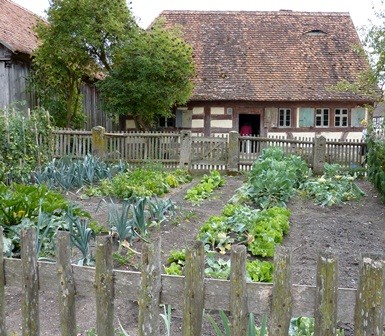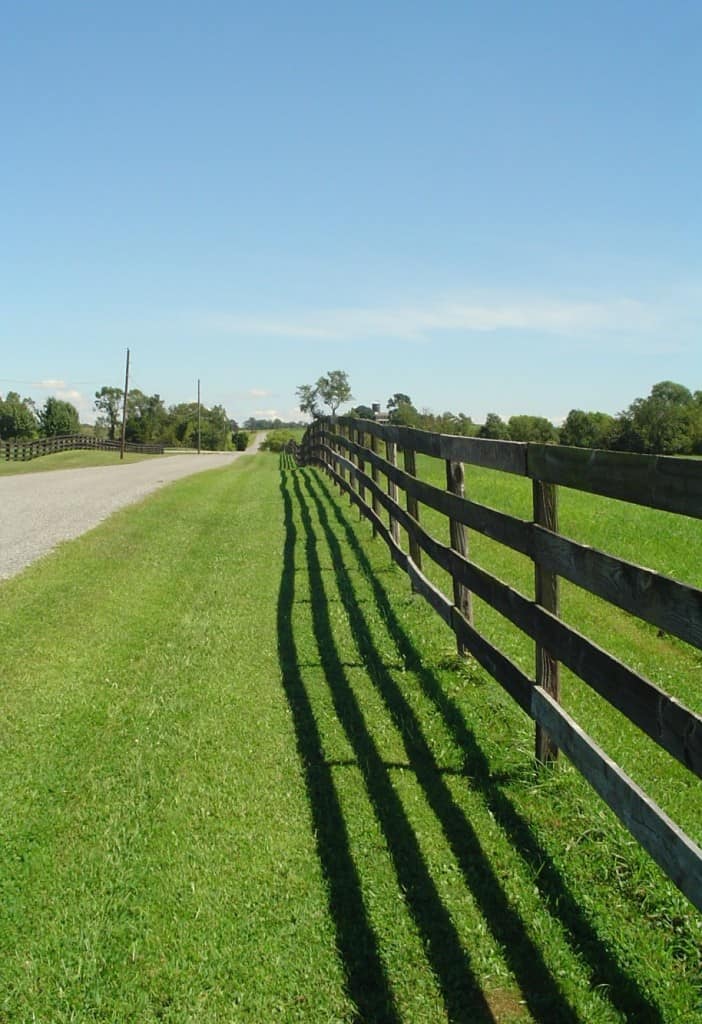Here I explain what you need to do before putting up fencing. Have you been looking around your yard feeling that it lacks privacy, and you just don’t feel as though the space is your own?
Installing a fence around your property, specifically, your backyard, creates a designated area. Sometimes it offers real privacy and others more of a “sense” of privacy. It’s nice to be able to go out in your backyard and not look at neighbors, however much you like them. Fencing allows you to really make the space unique and your own.
If you have pets, small children, or even chickens, then a fence also acts as a safety measure making sure everyone and everything is kept safely within the backyard.

5 Things To Do Before Putting Up Fencing
So, before you jump right in and tackle the job yourself, there are some tips you need to consider.
1. Know Where Your Property Line Is Before Starting
You must accurately determine and verify your property line. Know the exact boundaries before installing the fence. Many homeowners think they know where their property line is but you won’t know for sure until you verify it.
- Review your property deed: Your property deed contains a detailed description of your property’s boundaries.
- Examine your property’s survey: If it’s available, a property survey conducted when you bought the house will give exact boundaries.
- Hire a land surveyor: A professional will be able to determine this.
- Check local records: Your local assessor’s office or town hall might have records of your property’s survey.
2. Understand Local Regulations and Utility Locations
It’s essential to learn your local zoning and building regulations before you begin. You may be required to obtain specific permits for fence construction. Failing to comply with regulations can lead to legal complications or fines.
If you have a Homeowner’s Association (HOA), consult the convenants (CC&Rs) to learn what is and isn’t permitted. While yours may allow fencing, it may need to be a certain type of fence (such as vinyl instead of wood fencing). They may also have height limits and other requirements.
Additionally, identifying underground utility lines is essential for safe digging. Striking a utility line can be dangerous and may disrupt services not only to your home but also to your neighborhood.
To locate the lines:
- Call 811, the National Call Before You Dig Number: This free service will notify your local utility companies of your intent to dig.
- Utility companies will mark the lines: Within a few days, they will come out and mark the locations of underground lines with flags or spray paint.
Do this correctly from the start to avoid legal issues and disputes with neighbors. If you ever choose to sell your property, it will be important too.
3. Rent a Post Hole Digger
If you are planning to install the fence on your own, without professionals, you can rent a post hole digger. Using a post-hole digger attached to a tractor can make the process of constructing long fences faster and less labor-intensive.
There are basically two types of tractor mounted post-hole diggers: Power Take-Off (PTO) operated and hydraulic flow operated. Be sure to follow safe practices. Read all instructions and realize there are risks involved. You may decide it’s best to hire a professional. It’s critical to us proper horsepower and rpm during operation.
4. Communicate with Your Neighbors
From personal experience, I think it’s courteous to speak to your neighbors and tell them about your plan for a fence before the job begins. Installing a fence can affect them too, so it’s common courtesy to let them know.
However, I realize this depends a lot on your relationship with your neighbors. Hopefully you get along! If you don’t know them, it’s a great way to meet them.

5. Choose the Right Type of Fence for Your Goals
Think about your top three reasons for wanting to install fencing. What is the most important reason? Spend time to consider if you are:
- Looking for privacy when you hang in your backyard
- Trying to safeguard an area around a pool
- Wanting a place to let your dogs out without them running away
- Don’t want to be seeing into your neighbor’s windows
- Extra barrier of security to access your property
- Keeping deer out of your yard
- Defining your property or area
- Raising livestock such as pigs, goats, cattle, sheep
- Raising chickens and want to let them out of their coop
Whatever, the reason, installing the right kind of fence is important for you to meet your goals for wanting the fencing to begin with.
There are different materials, designs, and heights, all of which accomplish different things.
If you want a fence for privacy, then it’s best to look into privacy fencing. If you’re just looking for a basic fence to keep the kids in the yard, then maybe a chain link fence is all you need.
Think carefully about the right kind of fence for your needs. There are various materials, designs, and heights to choose from, each serving different purposes. If privacy is your goal, a privacy fence is ideal. For basic boundaries, a chain-link fence might suffice.
6. Hire a Professional Even If It’s Just for Part of the Job
It’s no secret that installing a fence is very tedious, time-consuming, and very labor-intensive. With that said there is also knowledge that is needed in order to install it properly and securely.
Installing a fence requires specific knowledge and tools. Hiring a professional, even for part of the job, can ensure a proper and secure installation.
Professionals can handle various fence types, including wooden, chain link, vinyl, and ornamental, often with tools and expertise you might not have.
They also will be able to do it faster than you can.
Another important aspect of hiring professionals is the guarantee of workmanship they may provide. Many fencing companies offer warranties on their installation work. This means if any issues arise due to the installation process, they will address them at no additional cost.
Experts will know the best techniques and materials to use for different environments, soil, and purposes.
Conclusion
Each of these tips will help to ensure your fence installation is legal, safe, and hopefully meets your expectations. Again, doing things right from the start will help you be happy with your new fence.
Related articles:


After the tough rejection I faced from my dream job interview, I decided to go home to our province and spend the rest of the holiday season there to recollect my thoughts. It’s good to know that aside from keeping the pests away from your backyard, installing fences also acts as a protective measure. Since I’ll be staying here for quite a long time, I will consider installing temporary fences to keep trespassers from passing through our property as well as the farm animals of our neighbor.
Thanks for the tip about how hole diggers are important to also rent when planning a farm fencing installation service. I’m interested to know more about taking care of livestock someday so I’d like to know about the optimal kinds of fencing involved with that. Hopefully, I can get that set up once the weather clears up in the spring.